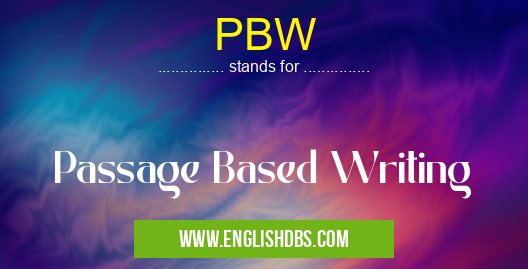What does PBW mean in UNCLASSIFIED
PBW stands for Passage Based Writing. It is a type of writing task that requires students to analyze and respond to a given passage. PBW is commonly used in educational settings to assess students' comprehension, critical thinking, and writing abilities.

PBW meaning in Unclassified in Miscellaneous
PBW mostly used in an acronym Unclassified in Category Miscellaneous that means Passage Based Writing
Shorthand: PBW,
Full Form: Passage Based Writing
For more information of "Passage Based Writing", see the section below.
Introduction: PBW Meaning and Significance
Key Features of PBW
- Involves analyzing a given passage: Students are provided with a passage to read and understand.
- Focuses on specific aspects: PBW tasks often require students to focus on specific aspects of the passage, such as the author's purpose, main idea, or supporting evidence.
- Requires critical thinking: Students need to critically engage with the passage, identify its key features, and draw inferences.
- Assesses writing skills: PBW not only tests students' comprensión but also their ability to write effectively and organize their thoughts.
Benefits of PBW
- Enhances comprehension: By analyzing the passage, students deepen their understanding of its content.
- Develops critical thinking skills: PBW encourages students to think critically about the passage and form their own interpretations.
- Improves writing abilities: Writing responses to PBW tasks helps students practice organizing their thoughts, using appropriate language, and supporting their claims.
Types of PBW Tasks
- Summary: Students summarize the main points of the passage.
- Analysis: Students analyze the passage to identify its structure, purpose, or message.
- Response: Students respond to the passage by sharing their thoughts, opinions, or connections to their own experiences.
Essential Questions and Answers on Passage Based Writing in "MISCELLANEOUS»UNFILED"
What is Passage Based Writing (PBW)?
Passage Based Writing is an educational assessment where students are presented with a passage of text and asked to respond to questions about its content. PBW helps educators evaluate students' reading comprehension, analytical thinking, and writing skills.
Why is PBW important?
PBW is important because it allows educators to assess students' ability to:
- Comprehend complex texts
- Identify key ideas and supporting evidence
- Analyze and interpret information
- Communicate their ideas clearly and concisely
- Apply critical thinking skills
How is PBW different from traditional writing assessments?
Traditional writing assessments typically ask students to write about a topic of their choice, while PBW requires students to respond to a specific text. This difference allows educators to focus on students' ability to read and analyze texts, rather than their prior knowledge or personal opinions.
What types of questions are typically asked in PBW assessments?
PBW assessments may ask students to:
- Summarize the main ideas of the passage
- Identify specific details and supporting evidence
- Analyze the author's purpose, tone, and style
- Draw inferences and make connections to other texts
- Evaluate the validity of arguments and evidence
How can students prepare for PBW assessments?
Students can prepare for PBW assessments by:
- Practicing reading and analyzing complex texts
- Developing strong vocabulary and background knowledge
- Learning to identify key ideas, supporting evidence, and author's purpose
- Practicing writing clear and concise responses
- Seeking feedback from teachers or peers on their writing
Final Words: PBW is a valuable writing task that fosters students' comprehension, critical thinking, and writing abilities. By analyzing and responding to given passages, students develop essential skills for academic success and beyond.
